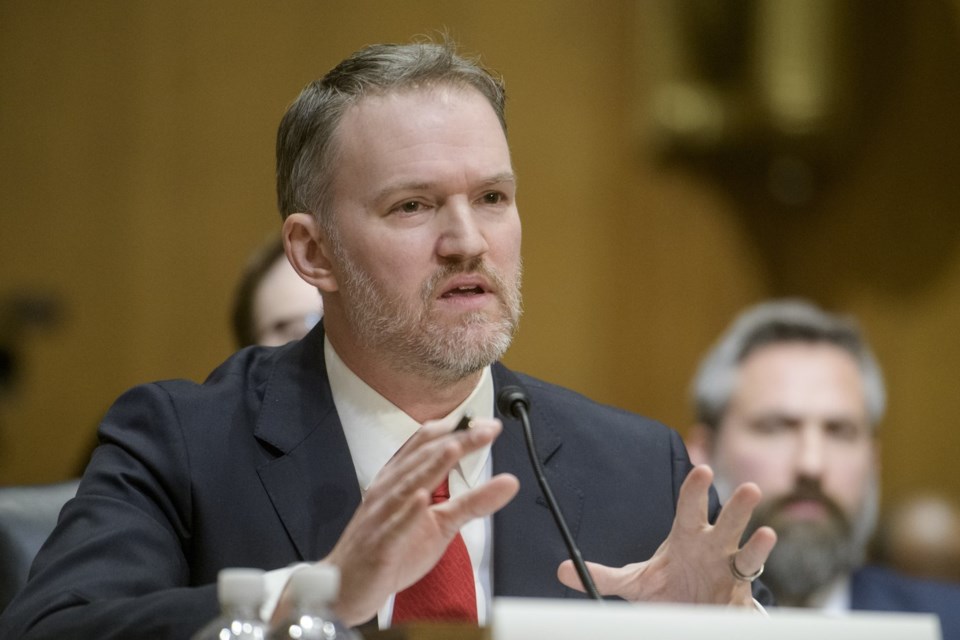WASHINGTON — The man likely to be named the United States' chief trade negotiator argued Thursday that President Donald Trump's tariff threat against Canada is about fentanyl trafficking as he faced questions about the levies from Republicans and Democrats.
Jamieson Greer, Trump's choice for U.S. trade representative, told his Senate confirmation hearing that America doesn't want to see another fentanyl death. He said the president would be acting within his powers if he imposed steep duties on Canadian imports.
Congress has authority over taxes and foreign commerce but Trump pushed ahead with the levies using the International Economic Emergency Powers Act (IEEPA), a national security statute that gives the U.S. president authority to control economic transactions after declaring an emergency.
Peter Welch, a Democratic senator for Vermont, asked Greer directly if he thought the state of Canada's border security requires the use of these tariffs.
“Yes," Greer responded.
"I don't," Welch said.
U.S. border patrol statistics show that less than one per cent of fentanyl seized is found at the northern border.
Trump's decision Monday to pause 25 per cent across-the-board tariffs on all Mexican and Canadian imports — with a lower 10 per cent tariff on Canadian energy — has brought little relief. Trump has linked the duties to what he calls the illegal flow of people and fentanyl across the borders.
Trump is delaying the levies until at least March 4 in response to border security commitments from both countries. He has said it will allow time to reach a "final economic deal."
Greer said Thursday that it looks like Canada and Mexico have come to the table.
Experts have warned a trade war could harm the economies of both Canada and the U.S. and drive up inflation.
Canadian ministers were in Washington this week to meet with lawmakers, industry and Trump's team to find out what the president wants in exchange for dropping the tariff threat for good.
Energy and Natural Resources Minister Jonathan Wilkinson said that even among senior Republicans, the president's intentions remain unclear.
"I would say it’s certainly not clear to a lot of folks at the present time exactly what the president is aiming for," Wilkinson said Thursday.
Both Canada and the U.S. have concerns about the border and fentanyl, Wilkinson said.
Trump has complained repeatedly about the United States' trade balance with Canada. Wilkinson said Canadian officials are pointing out to American lawmakers that, once you exclude energy exports, the United States enjoys a trade surplus with Canada.
The Trump administration has highlighted how Canada has a "vulnerability" because it exports so much oil to the United States, Wilkinson said. Ottawa and the provinces should discuss the possibility of an oil pipeline to Eastern Canada to improve energy security, he said.
Wilkinson also made the case for a Canada-U.S. energy and resource alliance that would help the Trump administration achieve its energy goals, while countering China’s global dominance of resources like critical minerals.
There was agreement among Republicans and Democrats during Greer's Senate hearing that America's trade policy should push back on China's geopolitical influence.
Greer said he believes it's important to open new markets while expanding American relationships with countries that have similar values and standards.
Worried lawmakers also told the hearing they had been contacted by industry and business groups distressed at how the looming threat of a trade war with Canada and Mexico could affect their local economies.
Nevada Democrat Sen. Cortez Masto said her state's tourism industry will be devastated if Canadians stop travelling to Las Vegas. She said a Canadian company has already cancelled an order with a small business in Nevada, citing market concerns.
North Carolina Sen. Thom Tillis said it was time to put Canada on notice. The Republican acknowledged the tariffs could have an impact on his state's economy but accused Canada of being a laggard on defence spending and claimed the country takes advantage of America's border and trade.
"They are acting like petulant children," Tillis said of Canada.
Industry Minister François-Philippe Champagne and Defence Minister Bill Blair had conversations about Canada's defence spending with officials in Washington this week. Ottawa has promised to meet NATO’s defence spending target — the equivalent of two per cent of gross domestic product — by 2032.
"Tariffs would actually limit our ability and reduce our ability to invest in our collective defence," Blair said in a call with reporters Thursday.
Greer played a key role in the first Trump administration by imposing tariffs on China and negotiating the Canada-U.S.-Mexico Agreement.
He was the chief of staff to former U.S. trade representative Robert Lighthizer as the trilateral agreement was being crafted to replace the North American Free Trade Agreement, which was terminated the last time Trump became president.
If confirmed, Greer will oversee the trade pact’s review in 2026. Experts have suggested that Trump's recent tariff threat is an attempt to rattle Canada and Mexico ahead of negotiations.
Greer said Thursday that there will be a "second look" at the trilateral pact. He pointed to issues related to rules of origin and types of market access, citing Canada's dairy sector.
— With files from Kyle Duggan in Ottawa
This report by The Canadian Press was first published Feb. 6, 2025.
Kelly Geraldine Malone, The Canadian Press

